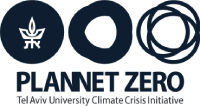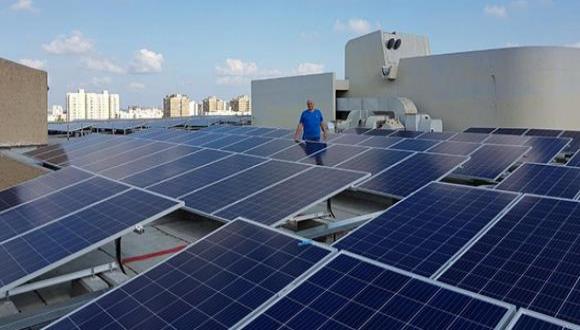We are part of the problem but also part of the solution
Tel Aviv University is launching the climate project whose goal is to bring together practical solutions in the field, to encourage research and to take part in policy design.
The TAU Climate Initiative was launched June 2021 at the Porter Building for Environmental Studies. The aim of the initiative is to bring together research efforts, to encourage collaborations and also (perhaps mainly), to emphasize the practical side, to make solutions accessible, to encourage multidisciplinary research and discourse, and to take part in the design of an ambitious climate policy and immediately.
The project was established in collaboration with researchers from around the campus, including Prof. Colleen Price and Dr. Orli Ronen from the Department of Environmental Studies , Prof. Marcelo Sternberg from the School of Plant Sciences and Food Security, Prof. Danny Rabinovich Sciences and more. The event was attended by researchers from all fields of study, who after presenting the difficult problems facing Israel and the entire world - told the general public in the format of short lectures about their activities in the burning field, presented practical solutions and even received the blessing of the outgoing president of the country, Mr. Reuven Robbi Rivlin.
A multidisciplinary center, where all fields of knowledge are focused on the climate issue.
The event was opened by Prof. Ariel Porat, president of Tel Aviv University, who initiated the project, emphasizing how much the fight against the climate crisis crosses faculties and fields: "When we asked members of the academic staff to name the three issues that they consider to be the future of their field, I was surprised when the representative from the Faculty of Humanities mentioned the crisis The climate as one of the issues. This was the stage when we began to think that this issue should be as broad as possible. There is no doubt that this is one of the most significant challenges that the world will have to face in the next decades, and I think that in establishing the project there is a statement that we want to be part of the matter and not watch from the sidelines. We can To contribute from our knowledge in reducing damages."
The Municipality of Tel Aviv also supports the project. Tel Aviv, which is on the list of greenest cities in the world and launched the climate change preparedness plan about a year ago, has long since realized that in order to live here in the future, we must act now. Deputy Mayor of Tel Aviv, Attorney Reuven Lediansky, who holds the environment and climate portfolio, welcomed the launch of the project, and spoke about the university's part in writing the municipal plan to deal with the crisis. "Nearly a year ago, we became the first city in Israel to launch a holistic and serious plan to deal with the crisis . The program placed us in line with major cities in the world such as Berlin, Amsterdam, New York and Paris, which have been working with determination for some time in order to influence and prepare to deal with the climate crisis. I am proud of the long and in-depth professional process that the Authority for the Environment and Sustainability led, with the professional assistance of Dr. Orli Ronen, to formulate such a comprehensive and professional plan.
He also told Diansky that at the C40 organization conference held in Copenhagen in 2019, the municipality pledged that by 2030 an additional 100,000 trees would be planted throughout the city, the use of private vehicles in the city would be reduced from 54% to 30%, the landfilling of waste would drop significantly from 67% to 26% and the use of renewable energy will increase, and that by 2030 100% of the city's public buildings will be powered by renewable energy.
"I am happy that we are maintaining close cooperation with Tel Aviv University in regards to issues of climate, sustainability, environment and ecology," said Ladyansky and added "One of our biggest challenges is to mobilize the business sector and the large entities that operate in the city and make them sustainable and environmental. Now a number of issues are being examined Such as expanding the layout of recycling bins on campus, expanding solar panels on the roofs of the library, installing an underground charging lane for buses near the Porter Building, etc. I am convinced that a project like the one we are launching today will lead to a more meaningful dialogue, and especially to active and meaningful activity on the part of the central government regarding the need for real preparation In view of climate change".
"The civic and academic duty of each of us"
Prof. Nega Kronfeld Shore, the chief scientist of the Ministry of Environmental Protection and a researcher at the School of Zoology in the George S. Wise Faculty of Life Sciences called for action: "The third decade of the 21st century is characterized by the understanding that in order to allow us and our children a healthy and balanced life We must consider nature and preserve it. Global warming threatens the existence of life on Earth. The implications are complex and we are only beginning to understand them, and there is no doubt that much research is needed on the subject. That is why we must also develop the ability to predict the wide-ranging effects of rising temperatures ecologically, economically and socially, so that we can develop ways to deal with them if possible. All of this requires a lot of interdisciplinary research, and I'm glad that the universities accept responsibility for this and put the issue at the top of their priorities."
Prof. Kronfeld Schor talked about the damages in the many areas that harm us and the environment: the pollution of the air and the oceans, the damage to biodiversity and the food and drinking water systems, the need to re-plan the cities where we live and more. She mentioned the changes we must make in the economic, social and consumer spheres. "In all these issues, the academy should lead. This is the civic and academic duty of each of us, and I hope that the university now raises the gauntlet on this issue and so it will be in other areas as well."
Too little water for too many people
If it is obvious that only researchers and scientists in the field of the environment have something to contribute to dealing with the crisis, the climate project has proven that the solution is everywhere - starting from engineers who find solutions to water shortages, through proposals from the field of psychology to the right ways to address the public and harness them for greener daily activities, to the legislative and social connection which can greatly affect our chances of stopping the disaster in time.
Prof. Hadas Meman, head of the environmental engineering program at the Ivy Walder Fleischman Faculty of Engineering , spoke about the imbalance in the amount of precipitation and clean drinking water that is expected to characterize the earth following the climate crisis and about the creative ways of her research to address the problem. Her words about the expected increase in the size of the population of the world integrated well with those of Prof. Alon Tal from the Department of Public Policy at the Gershon Gordon Faculty of Social Sciences , who pointed out the close connection between demographic stability and successfully dealing with the climate crisis regarding greenhouse gas emissions, and the importance of the responsibility of all countries - including the developing countries - in solving the problem
Dr. Dov Hanin, Head of the Parliamentary Clinic at the Buchman Faculty of Law , talked about the 'Change of Direction' program, which is aimed at the decision makers and is designed to promote a rapid change of direction in the State of Israel's approach to the climate crisis, and about the integration of the clinic's activity in promoting legislation while presenting program files The work for the coming year. The young lawyers who will go out into the world after completing their degree studies, will be able to change our future in Israel and perhaps even in the entire Middle East thanks to the important work already done during their studies.
And what about ordinary citizens? Prof. Shushi Shilo from the School of Psychological Sciences , discussed the question of what to do with the enormous despair of the alarming environmental data and how to deal with them in a way that can also motivate us to action instead of sinking into paralyzing depression. Is the method of intimidation correct when it comes to such a serious problem? Or are there other ways to approach the neighbor from the floor below to convince her to start separating waste, lower her consumption of animal protein and enjoy walking more than driving in her private car in the city?
But as we know, in Israel the sun does not always allow us to take advantage of public spaces. In fact, for eight months of the year the degrees in Israel exceed the average, and the forecasters warn us against the continuation of the trend. Prof. Avi Kribus from the School of Mechanical Engineering presented the renewable energy solutions that are mainly suitable for the State of Israel, which will allow us to optimally utilize the resources we have in abundance, for example solar energy, and shined a spotlight on the efforts that already exist.
A green revolution in the Naftali building
Prof. Itai Sand, dean of the Faculty of Social Sciences, presented a practical plan that is already taking shape, which is about to turn the Naftali building into the greenest building on campus. "The idea is to combine everything that has been said here with the help of Prof. Hadas Meman and our talented students, to face this enormous challenge of global warming, and turn our large building into a green environment."
She also spoke to Lior Hazan, the chairman of the student union, who promised to sow the seeds of change among the student community, the natural audience for activity on the issue, and to promote making the campus greener.
Prof. Colin Price, head of the environmental studies department and the project's initiators, concluded the meeting. "Will we also be able to contribute to finding solutions? It seems so. We have expertise and minds here from nine faculties, and in each of them there are people dealing with the climate issue, so we have an interdisciplinary model that we can use. We also have bodies outside the university, partners, who want to work with us. We need to start from the bottom and influence the public's behavior. We can show the government that it is economically worthwhile to switch to renewable energy, but it will never work without the will of the public, and vice versa."


